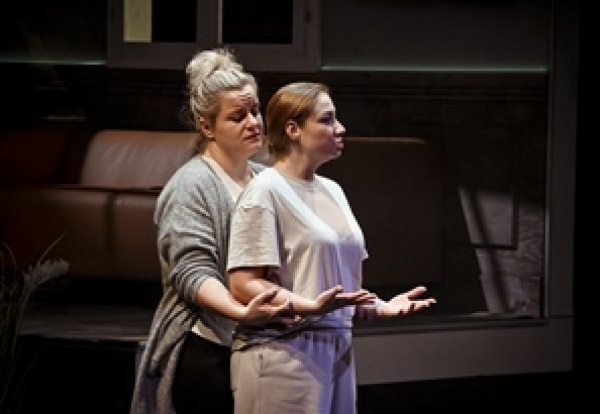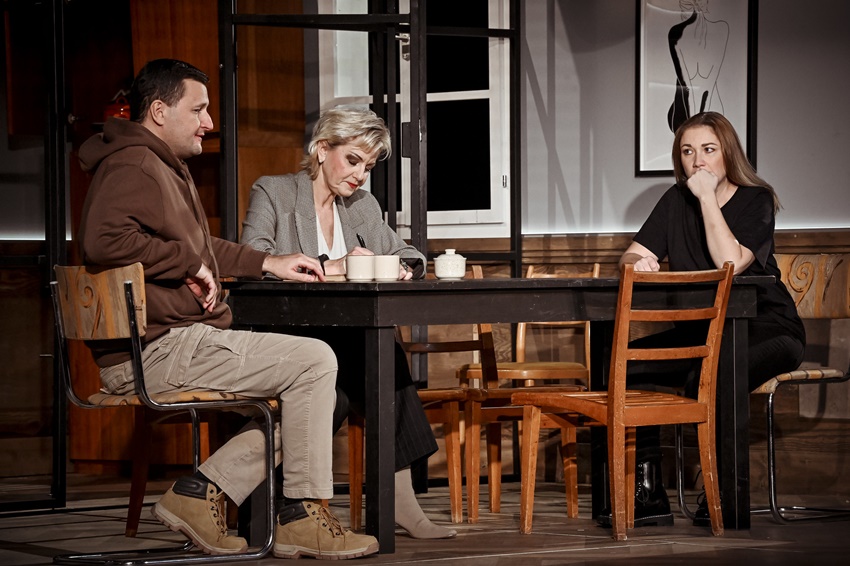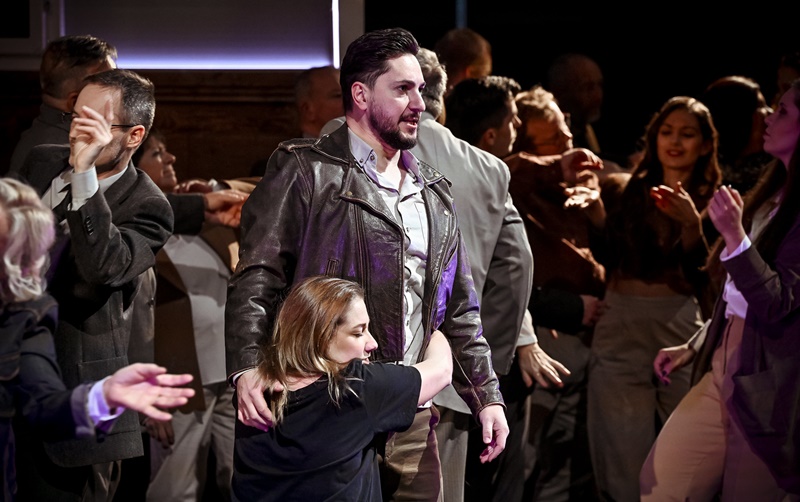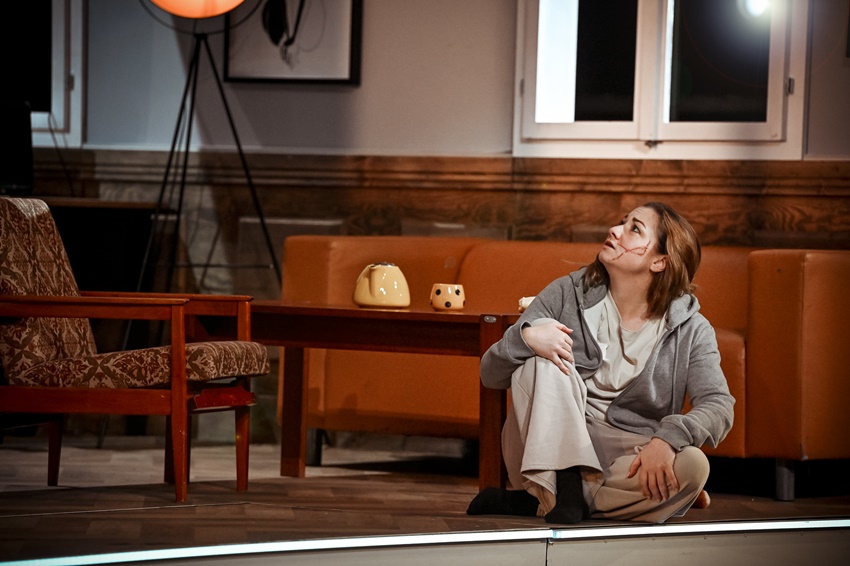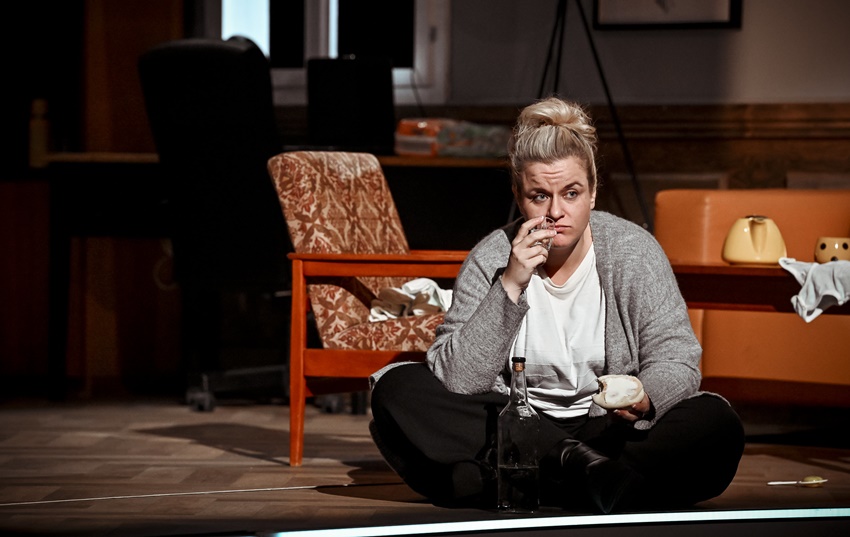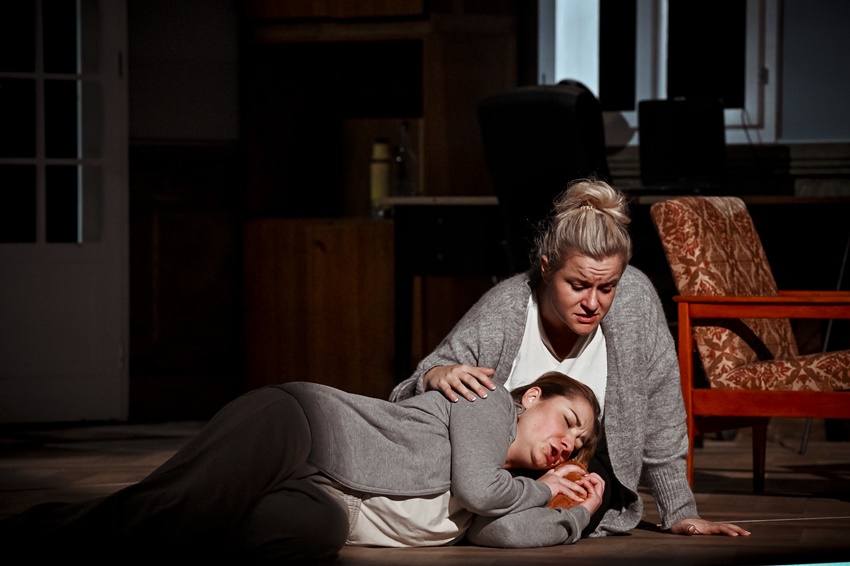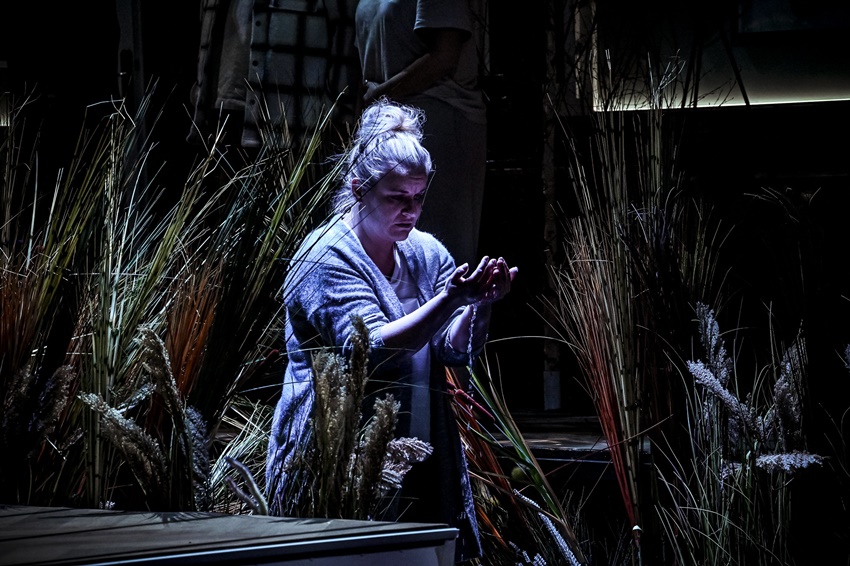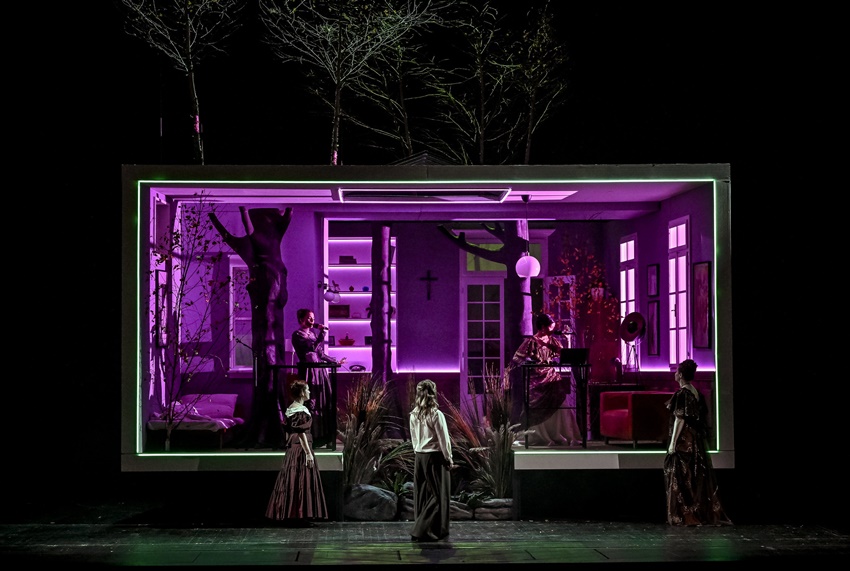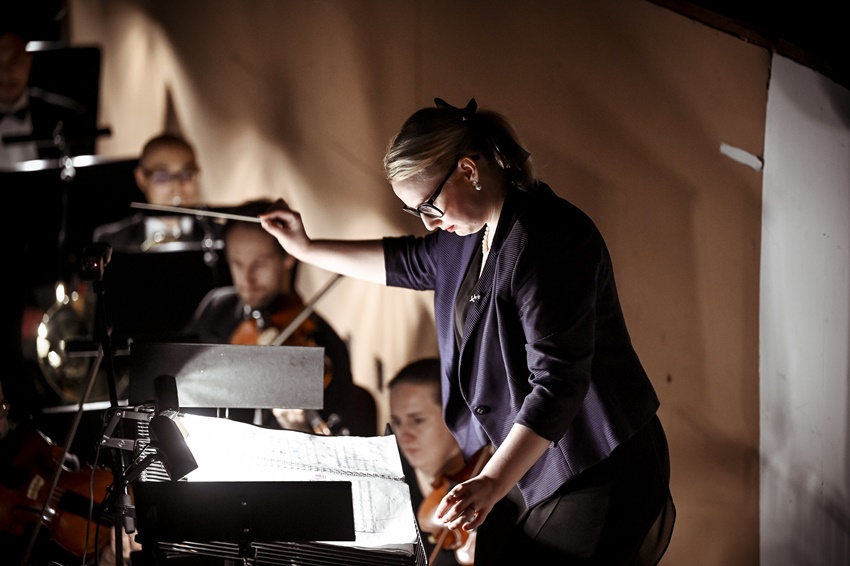It would be an exaggeration to speak of a scandal, but the fact is that after the performance of Jenůfa, some audience members expressed their displeasure by booing (while others were bravoing, though the majority gave a polite applause to show their approval, appreciation, reservation, or perplexity).
The director, Veronika Kos Loulová, and the dramaturg, Marta Ljubková, had indeed rewritten Janáček's opera, including its ending.
We heard the first, rarely performed 1904 version of Jenůfa. This version is more challenging for both the singers and the orchestra than the later version, and it is somewhat longer.
Except that this longer version was made shorter by the production's creators, who made cuts in Act 1 and especially in Act 3. The staging of this shortened longer version did, however, result in a longer performance, as at one point during the performance we listened to short spoken monologues, and, after the performance, a song sung by two female soloists of the Czech electropop band viah (spelt like this, with a small initial).
Through Jenůfa's fate, the director wanted to draw attention as sharply as possible to the so many similar fates of women. She juxtaposes the sad story of the 19th-century village girl, stigmatised for having a child out of wedlock, with the stereotypical 'happy mother' role that much of society still expects of women today, often tabooing the traumas of pregnancy, childbirth, and the aftermath. The intention is respectable, and the performance is brave and thought-provoking. The message is clear, even if I find the mentioned parallel a little one-sided. (The work is, of course, about many other things: jealousy, love, sexual desire, forgiveness.) However, I have further reservations about the production, and about the way the director's intention is realised, concerning the cuts and alterations.
Josef Moravec (Laca), Sylva Čmugrová (Grandmother Buryjovka),
and Barbora Perná (Jenůfa)
Raman Hasymau (Števa) and Barbora Perná (Jenůfa)
It is a long-standing debate, at least since the rise of the director's theatre, how far a director can go in reinterpreting a piece. There is, of course, no clear answer to this; it is a matter of taste. With the new production of Jenůfa, I think the creators have gone too far.
Janáček's opera depicts the fate of a small 19th-century village, of a closed, archaic community of often miserable, foolishly prejudiced inhabitants. Kostelnička (i.e. the Sacristan), a prominent figure among the villagers because of her authority but no different from the others in terms of prejudice, is justified in her own view: she believes she will help her 'disgraced' stepdaughter Jenůfa by 'ridding' her of her baby, i.e. by committing the most horrible act imaginable: killing the child. The tragic work, however, ends with a happy ending in the current production. Jenůfa's little son, now a few years older, appears in the finale and runs into his mother's embracing arms. (At first, I thought he was from Jenůfa's new marriage to Laca. This would, of course, put the plot in a different perspective, because, although a possible development, it would greatly weaken the catharsis brought about by the opera's tragic ending. But we saw Jenůfa and Števa's child, the already dead boy.) In a panel discussion after the performance, the creators said they disagreed with the tragic ending, considering it unjust. The scene of Jenůfa embracing her child can, of course, only be interpreted symbolically, demonstrating that Jenůfa remains a mother forever, even after the death of her son, with an unchanging love for her child. And that in a 'better world', this tragedy should never have happened.
It's an unexpected and beautiful ending, but it can be confusing for some spectators. (There may be a lot of people in the audience who are watching this opera for the first time.)
Barbora Perná (Jenůfa)
Eliška Gattringerová (Kostelnička)
At the panel discussion, an audience member asked: is she right in thinking that now we were not watching Janáček's Jenůfa, but the director's Jenůfa? Veronika Kos Loulová answered in the affirmative, adding that everyone has their own interpretation of a work, including the director and each spectator. She is absolutely right. But it is one thing to interpret a work and another to rewrite it, both musically and in terms of the essential aspects of the story. This performance is only partly an interpretation of Janáček's opera. It is at least as much the director's own story, illustrated by the plot and music of Janáček's opera. (It is a provocative statement, but so was the staging.)
Jenůfa and Laca's final duet was also omitted. In this scene, the broken, grieving girl finally finds solace in Laca, the man who has courted her for so long with persistence and no chance. As the panel discussion revealed, the creators did not agree with this development either, finding it humiliating and unacceptable for today's audience that Jenůfa decides she needs a male support and therefore shares the rest of her life with Laca. However, Jenůfa and Kostelnička (who, according to the libretto, will go to prison for her actions) happily embrace on stage in the finale. Of course, the girl forgives the Sacristan in the original story, too, showing incredible dignity, empathy, and grandeur of soul. But this time it was something more than that: Laca disappeared, and in the finale, we saw only Jenůfa, Kostelnička, and the little boy. Again, this is more than an interpretation: it is a rewriting, a 'correction' of the story.
Shall we let Madama Butterfly stay alive and continue to live in a happy marriage (with Pinkerton, but preferably with someone else)? And let Desdemona not die at the hands of her sickly jealous husband, because of Iago's wiles, and live on in a happy marriage (with Otello, but preferably with someone else)? Because the two stories are 'unjust'? A good director – and judging by the performance, despite all my reservations, I consider Veronika Kos Loulova a talented director – has the sophisticated tools to shift the emphasis by nuancing the relationships between the characters, by directing the actors, by the sets, even by changing the time and place of the action, thus communicating her thoughts on the piece. Cutting out parts of the work, adding to it, rewriting the ending are not 'sophisticated tools'. In doing so, the director not only underestimates the impact of the Czech composer's opera on the viewer, but also underestimates a bit the viewer's ability to comprehend the story.
Eliška Gattringerová (Kostelnička) and Barbora Perná (Jenůfa)
Eliška Gattringerová (Kostelnička)
We know of many operas, of course, which are performed in several versions. But most of these are changes made by the composer (sometimes because of the censorship, sometimes for other reasons), other times for musical reasons (for example, in the case of Baroque scores with only indicative musical instructions), and some have developed 'organically' and become a tradition over decades or centuries. It is also possible to experiment with the completion of Turandot (if a well-prepared composer undertakes it), since Puccini could not complete it. But there are no such reasons in the case of Jenůfa.
At the beginning of the performance, before the music begins, Jamie McCartney's composition The Great Wall of Vagina is projected (40 photographs of vaginas). At one point during the performance, the orchestra stops and members of the Czech organisation 'A Mothers' Smile' (which helps women with psychological problems during pregnancy and after childbirth) read out words related to the agony of childbirth (e.g. 'bitten breast', 'swollen vagina', etc.). They sometimes appear on stage later, embracing Jenůfa and giving her strength. However, the monologues interrupt the musical flow. And the otherwise pleasant, catchy song of the band viah following the final chords of the opera is, of course, in sharp musical contrast to the sound and atmosphere of Janáček's work. It is out of place.
I have no doubt that the creators highly respect Janáček's work. Otherwise, they would hardly have spent a year and a half working on the production. However, I think in the process they became more and more addicted to their own ideas, and in the end, they forgot a little about Janáček, subordinating the work too much to the ideas they wanted to convey.
The elaborate blocking (positioning of the singers) and acting are among the strengths of the direction. The singers moved and gesticulated naturally, without mannerisms. The sets and costumes are sophisticated and well designed. The plot of the piece is set in the present day. This works well in the first act, in the scene in the dining room of the family home, as well as in the scene of Števa revelling. But it becomes increasingly anachronistic as the story progresses. Not so much for of the time of the action, but more for its milieu. Because we see the life of a middle-class European family where the stigmatisation of a woman raising her child alone is (thankfully) becoming less and less common.
The band viah
Conductor Anna Novotná Pešková
Barbora Perná, as Jenůfa, gave a commendable performance. Her portrayal, the dramatic arc, how the young girl, self-absorbed and treated with indifference and incomprehension by her surroundings in Act 1, rose to become a heroine by the end of the piece, was elaborate and credible. Her energetic performance was matched by a strong soprano voice, but she was sometimes pushing her voice in the upper register. If the young singer had sung less fortissimo, she would certainly have had more breath, and her performance would have been dynamically more nuanced vocally.
The role of Kostelnička is no less important, the vocal part enriching the great dramatic soprano repertoire. Eliška Gattringerová, who now played the Sacristan, gave an exceptionally impressive performance. She is also a young singer, who has vocal maturity that belies her age, and she can also use her powerful soprano capably. Her elaborate acting was only somewhat weakened by the director's concept, making the stepmother less charismatic, resulting in the repentant confession of the grim, authoritarian woman losing some of its effectiveness at the end of the opera. Eliška Gattringerová certainly has a distinguished career ahead of her.
Josef Moravec, who sang Laca, was a good choice for the role. His portrayal of the young man's desperation over his seemingly hopeless love was believable. In a sense, Jenůfa and Laca's uniting at the end of the work is unworthy for both. Josef Moravec did not have a chance to illustrate the sad, bittersweet joy and belated happiness of Laca, who finally wins the hand of the resigned Jenůfa, as the final duet was not performed. Prior to this, the tenor's voice sometimes soared, sometimes strained, singing off pitch on a few notes.
A spirited interpretation was given by the other tenor, Raman Hasymau, who played Števa. He was wild, irresponsible, big-headed, and superficial, but his most memorable moments were when he confessed (with surprising sincerity) his feelings toward Jenůfa to the Sacristan. He seemed almost frightened of himself as he had to put into words his cowardice, his weakness, that although the pretty girl seemed a good party, he, Števa, did not want to face the difficulties: he was afraid of Kostelnička, and Jenůfa, now with a disfigured face, repulses him.
The mezzo-soprano Sylva Čmugrová, singing the role of Grandmother Buryja flawlessly, was also a standout.
The young conductor Anna Novotná Pešková brought together the opera orchestra of the Olomouc Theatre in Moravia along an elaborated concept and with an excellent sense of proportion. The musicians' interpretation of the extremely demanding score may not have been flawless, but they played with focus, discipline, and inspiration. The unusual events on the stage and in the auditorium may have distracted the audience a little from the orchestra's performance, but the musicians gave a more than acceptable, fine performance, also helping the singers effectively.
The choir sang reliably, enthusiastically (they also had to dance a lot in Act 1), and authentically Janáček's choral scenes, interspersed with Czech folk music motifs.
We saw a musically high-quality performance of Jenůfa in a fresh, divisive, controversial, but not self-servingly provocative direction.
Balázs Csák
photo: Marek Olbrzymek
*
20 November 2024, Brno, Mahen Theatre
Leoš Janáček:
Jenůfa
Opera in three acts
First version (1904) in the Mark Audus edition
Co-production of the Moravian Theatre Olomouc and the Janáček Opera of the National Theatre Brno
The production is produced in cooperation with the organization Úsměv mámy
Libretto: Leoš Janáček, based on the play Její pastorkyňa by Gabriela Preissová
Dramaturg: Marta Ljubková
Scenic designer: Irina Moscu
Costume designer: Irina Moscu
Lighting designer: Fiammetta Baldiserri
Chorus master: Michael Dvořák
Assistant to the conductor: Anna Svoboda
Musical preparation: Milada Jedličková, Lucie Kaucká
Musical study: Anna Novotná Pešková
Directed by Veronika Kos Loulová
Cast:
Jenůfa: Barbora Perná
Kostelnička: Eliška Gattringerová
Laca Klemeň: Josef Moravec
Števa Buryja: Raman Hasymau
Grandmother Buryjovka: Sylva Čmugrová
Stárek: Jiří Přibyl
Karolka: Helena Beránková / Kateřina Popová
Barena: Anna Moriová
Featuring the Orchestra and Choir of the Moravian Theatre Olomouc, members of the organization Úsměv mámy, and the band viah
Conductor: Anna Novotná Pešková


